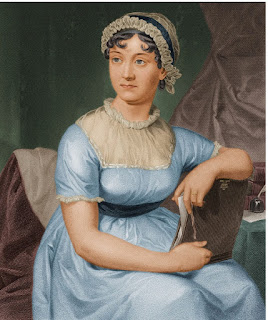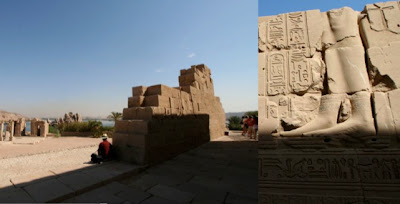(A chapter excerpt)
"Egypt eyes" - Anson Hunter's archaeology blog (adventure fiction)
I’m here in Aswan, Egypt, researching one of my
theories about the ancient past for a new book, when out of the blue I get an
invitation to show a young blind woman around Egypt.
I always like the sense of being drawn into
intrigue and in this case my sensors are resonating like ground-penetrating
radar. Also, I have a flexibility reflex that keeps getting me into trouble. It
lures me into accepting dubious propositions and offers of employment that help
to fund my investigations in Egypt.
So there I was at The Old Cataract, the hotel where
Agatha Christie penned her novel Death on the Nile. I entered the gardened
swimming pool area, which sits below a wide veranda with its famous cliff-top
view over the rock-strewn Nile at Aswan.
I found the blind young woman relaxing on a
poolside lounger.
“Hello, I’m Anson Hunter,” I said, approaching her.
She turned up her blonde head and her reflective
dark glasses sent flashes like empty mirrors.
“Thanks for coming to meet me, Anson. I know you’ve
taken groups around Egypt in the past and I am wondering… will you allow me to
hire you as my personal guide for a week or so? I want you to be my eyes in
Egypt.”
“Are you sure you need me?” I said.
“You’re thinking a guide dog might be a better idea,
perhaps Anubis, the dog god of the necropolis?” she said. “No, it’s you I want.”
It’s hard to believe now that even though I was
standing right over her at the poolside, I was probably just an elongated smudge
in her vision. Her female Egyptian assistant, who had emailed me, explained
that Dr Constance Somers has degenerative retinitis
pigmentosa and is now ninety percent blind. I think that’s being generous.
“Me show you Egypt?” I said, squinting against the
southern Egyptian sunlight. “How does that work?”
She smiled. “How do you show Egypt to a blind
person?”
“I wasn’t thinking that.”
“Then what? You’re wondering how you’d nursemaid a
blind woman around Egypt? Don’t worry. As you know, I have an assistant,
Saneya, to look after me when I really need help. She’s up there on the veranda
trying to read a book, but watching me in case I get up and dive into the
shallow end of the pool or something. Mostly I manage pretty well on my own
with my cane, except when I’m walking in a crowded street in a city like Cairo
and somebody bumps my shoulder and I’m spun around, then I don’t know which way
I’m facing anymore and that can be interesting.”
“That’s not it, either,” I said, glancing at the
long white cane lying on the grass beside her lounger. “At the risk of stating
the obvious, you’re a trained Egyptologist as well as being the world’s leading
space archaeologist.”
“And that’s your concern?”
“Yes. What could I possibly show you?”
“You’re different. You don’t see my condition, all
you see are my qualifications.”
Well, that wasn’t exactly true, I thought. I saw
other things about her.
I’ve been spending a lonely time at sites lately, poking
around Aswan on the trail of one of the sons of Rameses, so I couldn’t help but
notice the litheness of her figure revealed by the stretchy scraps of black
spandex and imagine secret areas of humidity beneath. The tremor of tightness I
felt in my stomach gave way to a twinge of guilt and I felt bad for looking.
This was like stealing from an unattended store.
There’s a voyeuristic aspect to staring at someone
who doesn’t know it and the experience is further tainted by a sense of guilt
when you’re looking at a person with a disability, albeit one as attractive as
all hell.
“Granted, I know Egypt,” she said. “Or at least one
dimension of it. But I want you to show me something different, the
unknown, unseen Egypt. Isn’t that what you specialise in as an alternative
Egyptologist, a phenomenologist who experiences the sacred of ancient Egypt?”
I’ve taken unusual people on tours of Egypt before,
New Agers, neo-pagans, fundamentalists, even Intelligence community people, but
the cool, slender-faced blonde, Doctor Constance Somers, is in a class of her
own. Yet here she is, a celebrated Egyptologist, saying that she wants to find
exactly the same thing that I do, the hidden Egypt.
But something else got in the way of her proposal
besides her medical condition or her skills set. She was asking me to drop my personal
research and investigations in order to accompany her.
“I’ll pay you well for your time,” she said. “I am
not entirely a sad case. Unlike most members of my profession, I do have a
dollar to scratch myself with. I inherited, you see. It took away the desire to
find treasures in Egypt and I could concentrate on finding more important
things.”
This well-heeled Egyptologist certainly has
concentrated on finding much more important things, like her discovery of a
celebrated stela of the Prince Khaemwaset at Saqqara.
I have been on the trail of the very same elusive
magician prince for most of my career. Khaemwaset, son of Rameses The Great,
and the world’s first Egyptologist, loved to investigate and restore the
monuments of the ancients, admiring the perfection of everything they made. Or
so he claimed in the carved stone tablets he left behind on their monuments,
‘the world’s biggest museum labels’. But the princely tomb raider had other
motives.
Legend told that Khaemwaset went secretly in search
of forbidden knowledge and power and he developed a reputation as Egypt’s
greatest magician.
Maybe this invitation from Constance Somers is a
stroke of good fortune for me.
It’s an opportunity to work covertly from inside
the tent of the profession instead of outside in the wilderness.
My other project will have to wait. There is a
secret lying buried beneath the surface of this attractive and ill-fated young
academic and I am growing more and more intrigued with her.
“What do you have in mind?” I said.
“I heard you’re flexible. We’re going on a cruise to
Luxor, to kill a little time before our new archaeological season’s opening and
the team’s arrival. Then after that, we fly to Saqqara. We spend a week or so
on site there. I’m being replaced as head of the team and this is my sort of
unofficial handover. They can’t have a blind academic…”
“Leading the blind academics?”
“You don’t have a high opinion of us, I’ve heard.”
“And vice versa. That’s why I’m surprised you’d
take the risk of associating with me. I could tarnish your reputation.”
“I’ll take that risk. Maybe I want you because
you’re a renegade.”
“Intriguing.”
“It may surprise you,” she said, “but while I could
still read, I read your blogs and your books and theories and this will be a
more intimate sharing than with any other reader and no reader could feed on
your words more hungrily than I will. Like The Bard’s Dark Lady of the Sonnets,
I’ll be your lady in darkness that you can dedicate your musings to... even
though I happen to be a blonde and I can still see some light and blurry
shapes! Allow me to see your Egypt through your words and inspire me with the
Egypt of your imagination.”
“I admit it would be a career first to have a mainstream
Egyptologist hanging on my words. But I must warn you I’m no poet.”
“I’m no lady. I don’t want censorship, be warned. I
want your sensual reactions, too. I know you feel a powerful attraction to the
feminine allure of ancient Egypt, so if something turns you on, turn me on!”
“Wow. And I felt guilty for looking at you lying there
on that lounger!”
“The way you’re looking at me now?”
“It does seem a bit like stealing.”
“You think I can’t feel it?”
I was going
to have to work at this I was beginning to learn.
“I can see this may be a bit unnerving and I could
be the one walking on uncertain ground.”
“Good! That’s the kind of frankness I want from
you.”
Might she be hiding more than fading eyesight
behind those silvery dark lenses? Maybe things were not as they seemed and this
woman’s request for a guided tour had a secret motive. Was a blind woman
planning to lead me along some unknown path? Towards what?
“What do you look like these day, Anson?” she said.
“I saw a picture of you once years ago. Describe yourself.”
“Okay, I have sapphire blue eyes the colour of Brad
Pitt’s, or, as my ex-wife described it, I have eyes with the burning light of a
fanatic. I’m about as tall as Hugh Laurie’s Dr House and about as lanky as him,
or in other words, a beanpole. Oh, and my hair is about the colour of George Clooney’s,
or going a little wintry prematurely. Does that give you a clear picture?”
“I’ll judge for myself. Sit here.”
I sank beside her on the edge of the lounger.
“I may have been exaggerating a bit about Brad
Pitt, Hugh Laurie and George Clooney.”
“Just keep your eyes closed,” she said.
I obeyed. Having your face explored by a blind person
is an uncanny feeling.
You can feel your own topography emerging under
those spidery fingertips, and you are conscious of your flaws.
“Try to stay on my good side.”
Her fingertip examination felt like an archaeological
exploration, measuring out the length of my face, surveying the mounds of my
eyes and the bridge of my nose, probing the width of my mouth and the corners
and the length of my chin. Perfumed, sensitive fingers. I caught the scent of
an expensive sunscreen lotion, which put me in mind of ancient Egyptian
unguents and priestesses in gossamer sheath dresses.
“A clever face. Amiable, flexible, yet with great
constancy of purpose. Thank you, Anson.”
“Will I be a great success in life?”
“I’m not telling you your fortune.”
“You can go on looking.”
“I’ve seen enough.”
“There’s more.”
“Some people find it a little odd. But it helps if
I can picture your face then I can picture your expressions.”
“Okay, then now it’s my turn. I’ll start with a wide-ranging
field survey, beginning with the toes and then working my way up to the top.
Would you like me to add some sunscreen on you as I go along?”
“You’re going to be fun, but no thanks. And I am
not an archaeological dig site.”
That was her opinion...










































